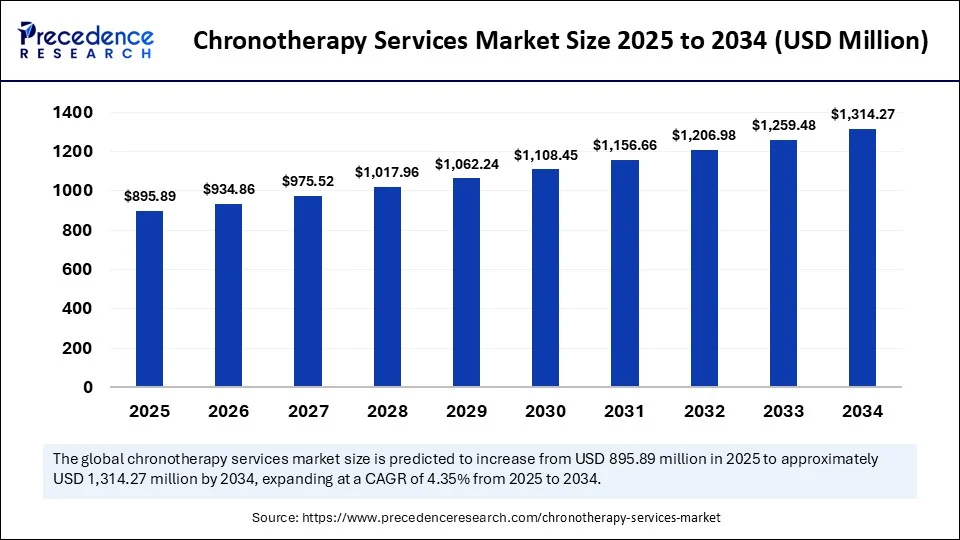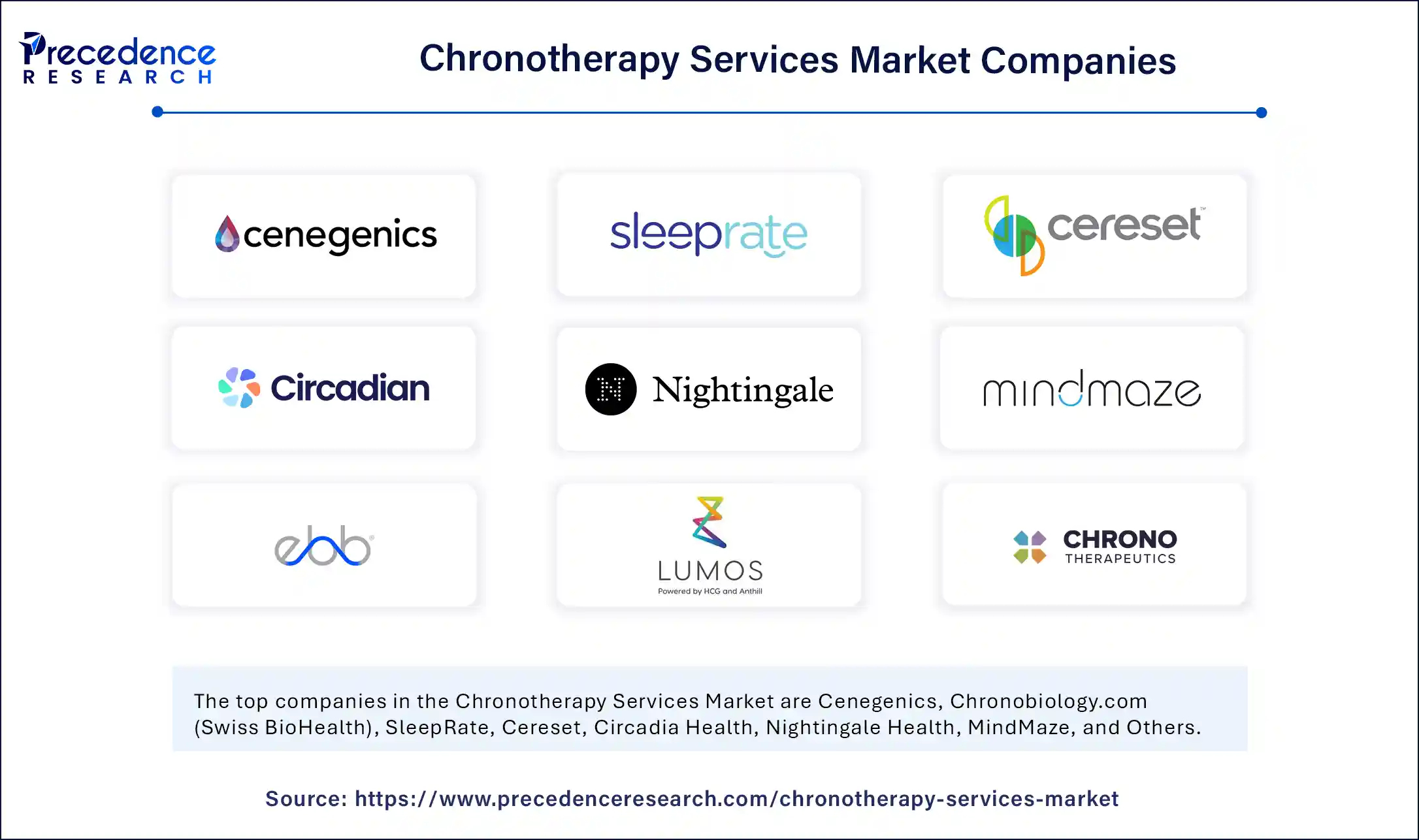The global chronotherapy services market will reach USD 1,314.27 million by 2034, up from USD 858.54 million in 2024, growing at a CAGR of 4.35%.

- The global chronotherapy services market was valued at USD 858.54 million in 2024 and is projected to reach USD 1,314.27 million by 2034, growing at a CAGR of 4.35%.
- North America led the market with a 41.50% share, while Asia Pacific is expected to grow the fastest.
- Sleep disorders dominated by therapy area, and chronotherapy scheduling led by service type; however, psychiatric conditions and diagnostic services are expected to grow rapidly.
- Clinic-based services and adults (18–65 years) were the leading segments by delivery mode and patient type in 2024, while home-based services and pediatrics & adolescents are poised for fastest growth.
- Among end-users, sleep clinics and chronobiology centers held the largest share, with home healthcare providers showing strong future potential.
How is AI Integration Transforming the Chronotherapy Services Market?
Artificial intelligence is transforming the chronotherapy market by enabling more precise and personalized treatment approaches. Through machine learning and predictive analytics, AI can process complex data such as sleep cycles, hormone fluctuations, stress levels, and vital signs to deliver tailored therapeutic interventions. In clinical settings and pharmaceutical research, AI plays a crucial role in identifying time-sensitive drug targets and optimizing chronopharmacokinetic models, thus advancing circadian-aligned therapies. As precision medicine gains momentum, the ability of AI to harness chronobiological insights and automate care personalization stands out as a major driver of the market’s rapid growth.
Get a Free Sample Copy of the Report@ https://www.precedenceresearch.com/sample/6328
Market Overview
The chronotherapy services market has emerged as a transformative segment within precision medicine, offering treatment strategies that align with the body’s natural biological rhythms. With increasing awareness of circadian cycles and their impact on the efficacy and side effects of medications, healthcare providers are shifting toward time-based interventions. Chronotherapy services involve optimizing treatment schedules for conditions like sleep disorders, psychiatric conditions, metabolic syndromes, and even cancer. This market is expanding due to advancements in diagnostics, growing patient demand for personalized therapies, and supportive research in chronobiology. The global chronotherapy services market was valued at USD 858.54 million in 2024 and is projected to reach USD 1,314.27 million by 2034, growing at a CAGR of 4.35% during the forecast period.
Drivers
One of the primary drivers of the chronotherapy services market is the growing prevalence of sleep disorders and mood-related conditions, which are closely tied to circadian disruptions. The increased screen time, irregular work schedules, and rising mental health concerns have pushed chronotherapy into the mainstream. Moreover, there is a growing demand for personalized care pathways where treatment schedules are tailored to the patient’s biological clock. Technological advances in wearable devices, digital health platforms, and AI-driven predictive analytics are enabling clinicians to gather and interpret data in real time, enhancing treatment precision. Pharmaceutical companies are also investing in research to design circadian-compatible drug delivery systems, adding further momentum to the market.
Opportunities
The chronotherapy services market holds significant untapped potential, especially in emerging economies where healthcare infrastructure is improving and the adoption of personalized medicine is accelerating. There is an opportunity for digital health startups and AI-based platforms to partner with healthcare institutions and bring circadian-focused services to a wider population. Integration with telehealth systems can expand access to chronotherapy consultations, particularly in underserved or rural areas. Furthermore, ongoing studies in chronopharmacology and biomarker discovery could lead to more refined treatment protocols, supporting the growth of high-value service offerings in this space. Expanding the use of chronotherapy in fields such as oncology, cardiology, and metabolic disorders represents another area of significant commercial and clinical promise.
Challenges
Despite the promising outlook, the chronotherapy services market faces several hurdles. One major barrier is the lack of widespread clinical awareness and training among healthcare providers. Chronotherapy requires a precise understanding of circadian rhythms and patient-specific biological data, which can be time-consuming to analyze without the right infrastructure. The market also contends with limited standardization of diagnostic and therapeutic protocols across regions, making it harder to scale services. Reimbursement policies remain a challenge, particularly in markets where time-based treatments are not fully recognized within insurance frameworks. Additionally, the reliance on technology for diagnostics and scheduling introduces cybersecurity and data privacy concerns that must be addressed to gain user trust.
Regional Insights
Regionally, North America currently leads the chronotherapy services market, accounting for over 41.50% of global revenue in 2024. The region benefits from advanced healthcare systems, early adoption of digital health technologies, and strong research infrastructure. The United States in particular has seen a surge in chronotherapy clinics and academic collaborations focused on circadian medicine.
Europe follows closely, driven by government initiatives supporting personalized medicine and mental health management. Asia Pacific is projected to grow at the fastest CAGR during the forecast period. Countries like Japan, South Korea, India, and China are increasingly investing in precision healthcare, sleep labs, and mental wellness programs. The Middle East & Africa and Latin America are showing gradual adoption, with growing urban populations and rising healthcare spending paving the way for market expansion.
Recent Developments
The chronotherapy services market has witnessed a series of significant developments over the past year. Key players are investing in AI and machine learning platforms that automate treatment scheduling based on real-time patient data. For example, wearable sleep trackers integrated with chronotherapy platforms now allow clinicians to fine-tune interventions remotely.
Pharmaceutical firms are developing chronopharmaceuticals that release active ingredients at specific times to align with circadian peaks. Research institutions are exploring gene expression timing to enhance the efficacy of antidepressants and other medications. In January 2025, collaborations between chronobiology centers and digital health startups surged, focusing on integrating behavioral therapy, drug delivery, and remote care. These innovations are reshaping how chronotherapy is administered and are expected to propel the market significantly forward.
Also Read : http://www.expresswebwire.com/pharmaceutical-rapid-microbiology-testing-market/
Chronotherapy Services Market Companies

- Cenegenics
- Chronobiology.com (Swiss BioHealth)
- SleepRate
- Cereset
- Circadia Health
- Nightingale Health
- MindMaze
- Ebb Therapeutics
- The Circadian Sleep Disorders Network
- LumosTech (Lumos Health)
- Chrono Therapeutics
- Pear Therapeutics
- Headspace Health
- ResMed
- Somnology Inc.
- BetterSleep (by Ipnos)
- Emfit Ltd.
- SleepScore Labs
- Nox Health
- Bright Therapeutics
Segments Covered in the Report
By Therapy Area
- Sleep Disorders
- Psychiatric Conditions (e.g., depression, bipolar disorder)
- Oncology (e.g., circadian-timed chemotherapy)
- Hypertension and Cardiovascular Disorders
- Metabolic and Endocrine Disorders (e.g., diabetes, obesity)
- Neurological Conditions (e.g., Alzheimer’s, Parkinson’s)
- Chronopharmacology in Pain Management
By Service Type
- Chronotherapy Scheduling & Optimization Services
- Diagnostic Services (Actigraphy, Salivary Cortisol, Melatonin Profiles)
- Behavioral & Cognitive Chronotherapy Programs
- Light Therapy and Circadian Realignment Programs
- Remote Monitoring & Wearable-Based Services
- Pharmacological Timing Consultations
By Delivery Mode
- Clinic-Based Services
- Home-Based Services
- Telehealth/Virtual Chronotherapy Consultations
- Hospital-Based Services (within oncology or psychiatry departments)
By Patient Type
- Adults (18–65 years)
- Pediatrics and Adolescents
- Geriatric Patients
By End Use
- Sleep Clinics & Chronobiology Specialty Centers
- Hospitals & Academic Medical Centers
- Behavioral Health Clinics
- Home Healthcare Providers
- Corporate Wellness & Occupational Health Programs
By Region
- North America
- Europe
- Asia-Pacific
- Latin America
- Middle East & Africa
Ready for more? Dive into the full experience on our website@ https://www.precedenceresearch.com/